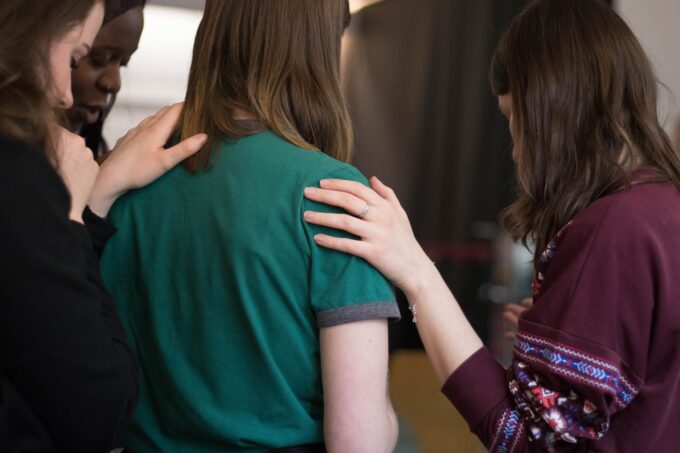When we are in an important social situation, we may feel nervous. For example, this might be a date with someone we like, a presentation at work or school, or a speech. There’s nothing wrong with feeling worried in such situations.
However, people who suffer from social anxiety disorder find everyday interactions unbearable.
Social activities can make some people feel embarrassed, disrupt their daily lives, and negatively affect their performance at school or work. Let’s find out what social anxiety is and how you can cope with it.
What Is Social Anxiety?

Source: helpguide.org
As children, we went through numerous moments of discomfort, embarrassment, or shyness in public. This is normal even for adults — different people may have different comfort levels in the same social situation, which means that some of us are more outgoing, while others are introverted.
Social anxiety disorder is a mental health condition characterized by anxiety, fear, and avoidance of social situations. It typically develops during the teenage years, but it is also common among children and adults.
Some of the main symptoms include:
- Fear of social situations
- Worrying about embarrassing yourself in a social situation
- Intense fear when talking to strangers
- Physical symptoms that include blushing, trembling, and sweating
- Social avoidance
- Intense feelings of anxiety or fear before and during social events
Social anxiety in children is also quite common but has different symptoms. Children with social anxiety disorder may throw temper tantrums, cry, or refuse to speak in social situations.
Social Anxiety vs Introversion
Social anxiety may have some common symptoms with introversion. However, the main difference is that introversion is a personality trait, while social anxiety is a mental health disorder.
Introverted people spend time on solitary activities. For instance, if you’re introverted, you may prefer to relax by yourself rather than join a party. However, the thought of spending time with others likely would not cause extreme anxiety. The reason is that introversion is a personality trait, which means that you prefer to spend time with yourself rather than with others. There are various online quizzes that may help you understand your behavior and personality.
People with social anxiety, however, feel lonely and frustrated because they struggle to spend time with other people. In this case, avoidance isn’t a choice. If you have social anxiety, you cannot participate in social events the way you would like to. You may experience fear and anxiety when you are in public and prefer to avoid such situations altogether because of intense fear or a feeling of embarrassment.
Social anxiety disorder is a mental health issue, so it may not improve unless you get support through therapy sessions with a mental health professional.
Causes of Social Anxiety

Source: unsplash.com
Like most mental health conditions, social anxiety disorder appears as a result of different factors. Some of the main possible causes are inherited traits, brain structure, and the environment.
Inherited traits mean that social anxiety runs in your family – however, it might be a learned type of behavior. The brain structure is important because our brain is responsible for emotions, including fear. To overcome your fears, you must know yourself first, and with the help from PersonalityData.org you can learn about your personality traits and better understand your behavior. Finally, environmental factors can lead to social anxiety — for instance, if you go through an unpleasant event, you develop anxiety that manifests whenever you are in a similar social situation.
Can You Manage Anxiety Without Medication?

Source: unsplash.com
Anxiety is a mental health disorder, and it can be treated through medication and therapy, although medication is not always necessary. You can manage anxiety without medication, and the tips below might help you.
Cognitive-Behavioral Therapy
Cognitive-behavioral therapy for social anxiety is a form of therapy that has proven to be effective in treating anxiety disorders. Essentially, this type of therapy focuses on finding irrational thought and belief patterns and replacing them with positive, realistic ones. In other words, a therapist helps you identify unhelpful thoughts that cause social anxiety and helps you understand how to replace them.
Replacing Negative Thoughts
Many people with social anxiety disorder experience fear and anxiety when overthinking certain situations. For instance, you may worry that you might trip in front of others, say something rude by mistake, or laugh at the wrong time.
The truth is that everything you may worry about could happen to anyone — for instance, it may seem horrifying to you to trip in front of your friends, but you can try to pay less attention to hypothetical situations. Instead, you can focus on what you can do to boost your comfort, such as wearing comfortable shoes and paying attention to your environment.
Even if you make a small blunder, nothing will happen. We all make mistakes in social situations, so your friends or strangers will most likely show you compassion over the awkward situation since all of us have already experienced it. In fact, such awkward experiences could break the ice and help you make new friends.
Be Prepared
If you have an important event coming up, such as giving a presentation at work or going toan interview , you can prepare ahead with one of your friends or a family member. Role-playing will help you get ready for any unexpected events during your social interaction, so you can come up with an appropriate response. Ask your friend or family member to use both best and worst-case scenarios.
How to Help Someone with Anxiety Disorder?

Source: unsplash.com
If someone struggles with anxiety disorder, there are a few things you should avoid, as well as things you can do to help them. Here’s how you can help someone with anxiety.
First, you may be tempted to overprotect your loved one — if they are afraid to go shopping, you may offer to go for them instead. Although you may want your loved one to avoid such situations, this might only lead to ever-growing anxiety, so they will become more and more fearful.
Instead of accommodating the environment for your loved one, help them overcome their fears. Offer to go shopping together, invite another trusted friend, and help them manage their anxiety. Ask them what frightens them the most and help them understand that fighting anxiety will eventually help them deal with it.
On the other hand, it’s important not to force your loved one to face their fear. Pushing them to do something they don’t want to or something that causes unimaginable fear might only break your bond. Show your dear one understanding and suggest that they talk to a mental health professional who has all the knowledge and experience to help them overcome their anxiety with ease and kindness.
Although visiting a therapist in the office may not be a convenient option for people with tight work schedules, everyone can benefit from online therapy. Platforms like Calmerry enable you to talk to a therapist remotely. Besides, online therapy might turn out to be a less stressful option for people with social anxiety.
Try to be sensitive and understanding, even if the thing that causes your loved one’s fear seems insignificant to you. Show them that you understand their position and encourage them to share with you what they are going through. You may also ask them if there’s anything you can do to help them cope with their feelings.
Conclusion
Social anxiety is a mental health disorder that can affect children, teenagers, or adults. It makes it difficult to socialize, go to work or school, and enjoy social situations. It’s perfectly fine to be an introverted person who loves to be alone most of the time – however, if loneliness impacts you, or you experience intense fear, therapy can help you overcome your social anxiety.
If you’re not sure whether you need therapy or not, you can learn more about the benefits of therapy you may not be aware of.







